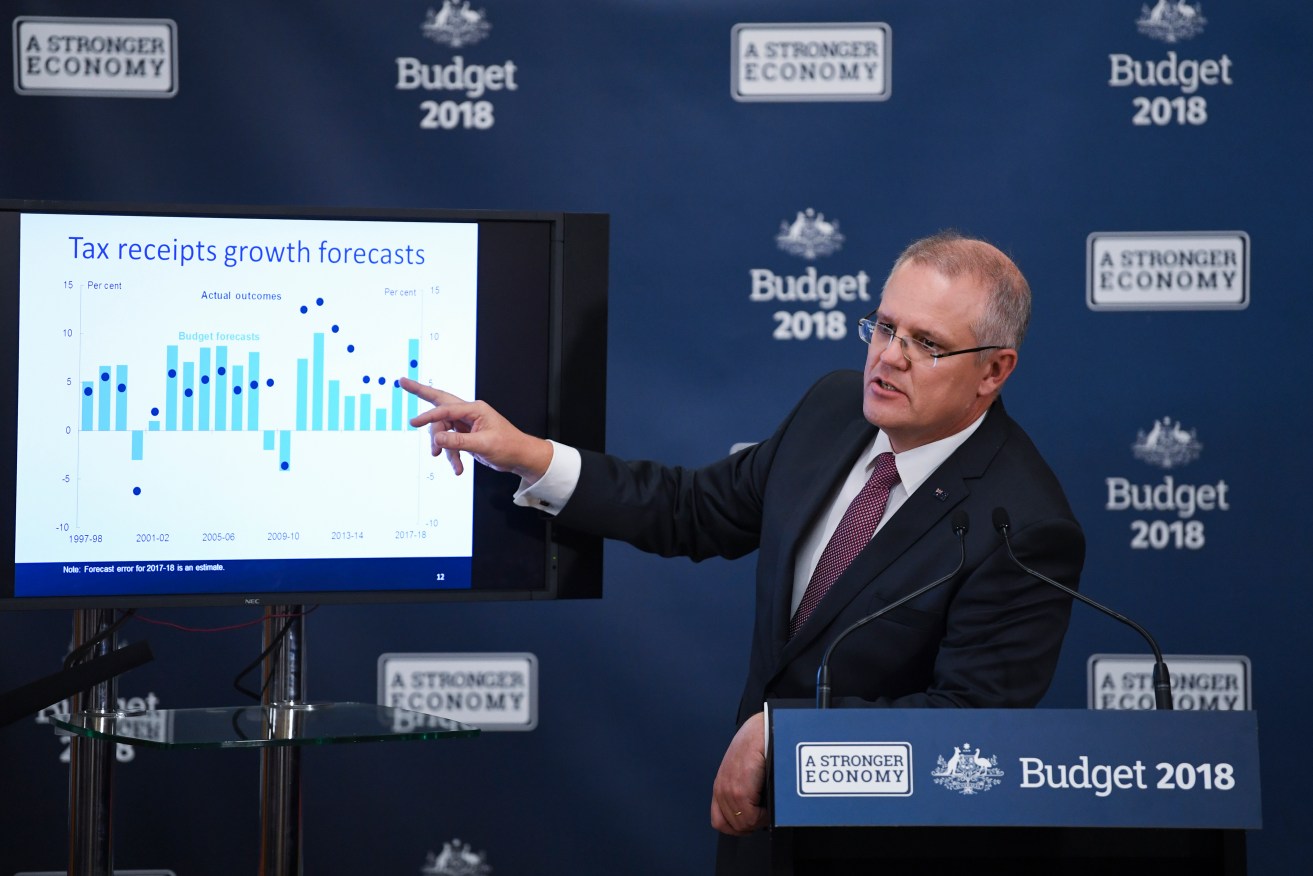Budget analysis: do politicians think we’re that bad at maths?
The federal budget once again avoids the hard work of structural change to Australia’s tax system, writes Adelaide tax lawyer Andrea Michaels.


Federal Treasurer Scott Morrison explains a chart to journalists in the budget lockup. Photo: AAP/Lukas Coch
Another year, another federal budget handed down. More fanfare, headlines and speeches. But facts are facts: we’ve got a whole lot of debt despite hitting 27 straight years of growth and the rewards aren’t there for our hard work – or good luck – no matter how many promises are made this week.
I know Australia ranks poorly on educational outcomes, but we’re not that bad at working out the maths, are we?
Despite being in dire straits budget-wise a few months ago, suddenly we’re in great shape with good times ahead. How is that possible? Well, it isn’t. We still owe a whole lot of cash, but we’ve decided to put off worrying about that too much this year. There’s an election coming after all.
Are there really rewards in this budget?
Did this budget really deliver anything of real value to anyone? Sure, it sounds good: lower taxes for the battlers, better care for the aged, help for retirees. That ought to tick some boxes in voter land according to some focus groups – especially with those who have been hit by unpopular superannuation policies in recent times, or low-income earners who are usually fans of the other team.
But if you look through the smoke and mirrors, there isn’t much in it. The immediate tax change for low income earners is a ‘tax offset’, so they can’t even use it to buy a cup of coffee every week. They’ll get their maximum $530 as a refund when they eventually lodge their tax return (maybe Harvey Norman will get a windfall).
As a targeted tax offset instead of a direct tax rate cut, it also avoids passing on any tax saving to those on higher incomes who would benefit if it were done as a tax rate cut even at the lower income brackets (basic maths).
Importantly, the substantive actual rate cuts are being proposed in the distant future (2024): I won’t hold my breath waiting for them to eventuate. There will be three federal elections between now and then, and I think the trust quotient for politicians is pretty low in the community right now.
Not that I mind the look of those proposed 2024 personal tax rates, and not that I object in any way to low income earners getting a tax break in the 2018-19 year, but one really has to ask: why bother with policies that achieve very little in terms of economic benefits?
We would see a greater economic improvement by bringing forward the personal tax cuts rather than waiting. Sure, it would have cost more than what was announced for the 2018-19 year, but I would have taken that extra cost off the proposed corporate tax cuts. That would do more to boost spending (retail spending is one of the weakest areas of our economy) with flow-on effects in creating jobs, improving wage growth and providing incentives for people to work harder and raise productivity.
These are the things the government says it is aiming for in the company tax cuts, but I’m not convinced we would see that come to fruition.
Living within our means
All of the announced personal tax cuts will end up costing us $140 billion over the next 10 years, in addition to the $80 billion allocated for the corporate tax cuts. These cuts weren’t done hand-in-hand with any major spending cuts in what was clearly a very safe, vanilla pre-election budget.
That simple equation means we’re not dealing with the national debt as quickly as we could be.
What about living within our means? Spending just because ‘our debt isn’t as high as we thought’ doesn’t sound like good fiscal management. In fact, in a very short space of time our debt levels have gone from one of the lowest in the OECD to middle of the pack. There’s not much margin for the budget if things go pear-shaped with the housing market in the east, or if we experience another event like the GFC.
It’s real change that’s needed
Former Liberal treasurer Peter Costello said this week we’ll all be dead before the debt is paid off, the way the government is going. It seems when we do make any headway, there’s always an excuse to spend.
So, despite the warm reception this very safe budget has received, I’m left wondering when any leader is going to make the kind of decisions that will benefit the country long-term rather than just themselves. Structural changes need to be made to our entire tax system and Australians are wise enough to understand that glossing over that might only make the journey harder.
I thought the #keepmytendollars movement on Twitter was an interesting insight into how many Australians are thinking. Maybe we can work out the maths and just maybe we are more thoughtful and mature than the politicians give us credit for. So, Mr Treasurer, you can keep my $10 too.
Andrea Michaels is the managing director of South Australian commercial law firm NDA Law and a tax lawyer. She is a member of the Labor Party.




